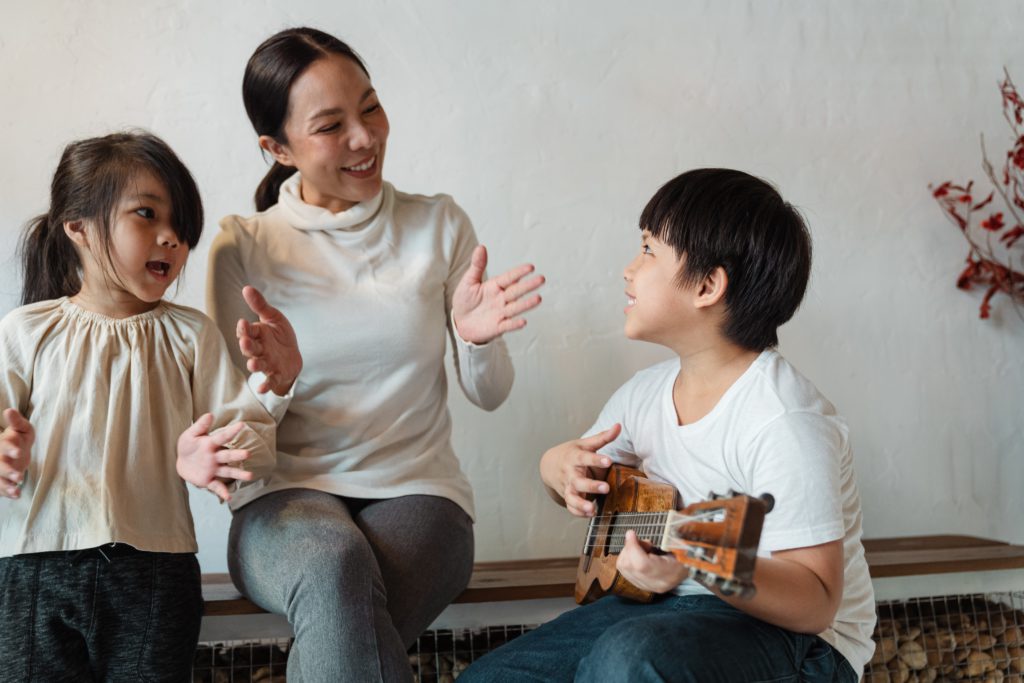Do you ever wonder why the ABC song taught to children has a catchy tune to it? Because that is the only way to grab the attention of a bunch of 4-year-olds – Singing! They say the best learning takes place when you are having fun with it. This especially holds true with the little ones who have an attention span shorter than an ad break.
Children are impressionable and they can take up massive amounts of information and retain it too. But you need to make it a fun experience for them lest they lose interest. There is quite a lot of science and research behind it. Learning can be optimised when you can find a way to associate emotions with it.
Language teachers should always encourage singing songs to reinforce the semantics of the language they are teaching.
Bringing in some music to a class can not only ensure quick learning but a great time too. Children would be eager to attend the lessons if they view it as a fun activity. Singing along to some catchy tunes in a classroom, who would not want that?
Here are some reasons why it can prove beneficial for children to sing songs in a language they are trying to learn:

Singing Lyrics Can Teach New Vocabulary
While taking up a new language, vocabulary is the hardest and takes the longest time to learn. As a beginner, it almost always feels like you are clawing at words. Knowing exactly what you want to say but not knowing how to put it in English is all too common in children. This can be very frustrating.
But through songs, children can learn new words and remember them well too. They will also get an idea of how a particular word is used. The new idioms, expressions and phrases introduced through singing will let them develop their spoken English.
Authenticity
Songs almost always are a reflection of the language used by the native-speaking population. Thus, they can teach a language in its original form.
Texts found in coursebooks can feel very artificial, as they are specially designed for people who are not native speakers of that language. They tend to feel contrived.
Of course, you will have to screen the songs for your children to eliminate all the ones using foul or crude language. Singing songs is a real window into how that language is actually spoken.

Grammar
All languages have varied rules of grammar. English, especially, has a grammar that some people would call “complicated”. Even adults have a hard time acquainting themselves with all the rules of grammar, let alone children.
Songs are a good way to inculcate correct grammatical skills in your children. As they sing along to songs, they will get a clearer idea of how sentences are constructed. Once they master the grammar aspect of English, there is not much to the language that will pose a challenge.
Cultural aspect
Songs are a really good way to get an account of the culture associated with a language and its native speakers. It is crucial to learn the culture behind a language to be able to be fluent in it.
Learning the culture brings about a deep understanding of a lot of idioms and phrases used in a particular language. It will provide a much-needed polish to a child’s English speaking skills. Songs have a good way of portraying the culture through the repetitive use of themes or stories.
Moreover, getting introduced to new cultures early on in life makes your child more aware and respectful of diversity. This is an added bonus of strengthening your child’s character along with working on their English.
Singing is a great way to learn/improve Accents
The English language is spoken in so many parts of the world and owing to this fact; it has left a huge trail of accents in its wake. There is British English, American English, Irish English, Caribbean English, etc.
If you make it a point to introduce different singers and genres to your child, they will be exposed to a myriad of accents. Learning to place an accent is important in English.
Also, some accents are thicker than others and thus may pose difficulty during comprehension. But with practice, your child can become acquainted with the spectrum of English accents and maybe pick one (or more) up along the way.
Positive atmosphere
Singing songs creates a delightful, entertaining vibe in the classroom that children enjoy. They can learn English while grooving and singing along to some melodious, catchy tunes.
They will feel more welcomed and it will create a more conducive environment for learning. Learning a foreign language and especially English can prove intimidating for the younger ones. Singing songs can take the edge off and erase their nervousness.
The more joy you evoke in them, the more they would want to come to class. This will then lead to better results when it comes to mastering English.
Increases participation

In a class full of children, it is unlikely that all of them are at the same level of learning. It is entirely possible that some kids have English as their first language at home and are thus better at it.
There may be others whose first exposure to the language was maybe when they entered the classroom. To find a common ground for them all, you need to eliminate this obvious disparity.
Singing songs is a good way to do that because the beginners would not feel like they are under the spotlight. They can learn it at their own pace without feeling pressured. On the other hand, advanced learners can sing along and enjoy as well while they better their inflexion, intonation and pronunciation. So, it is a win-win for all.
Revision and review
The most important thing while learning anything is to not keep forgetting your basics as you forge ahead in the advanced lessons. Revision is key in excelling at anything.
This is also the part that many people take for granted because truth be told, revisions are boring.
To hold the attention of your tiny ones, you must introduce a fun way of revision. And songs provide a means for just that. They can have a little fun as they sway to the rhythm of the songs while singing along and polish their earlier lessons.
Now that we have made you aware of all the advantages that a young learner can gain from singing songs, get right down to it. Find some songs that are suitable to your child’s age group, put them on and let the magic begin!
Learn Singing Online from Monali Thakur
If the sound of learning singing online piques your interest, we urge you to try out our unluclass by Monali Thakur. She is an award-winning singer who knows all the ins and outs when it comes to music. Her vast experience paired with her undeniable talent will ensure a delightful learning experience.
Subscribe to Monali Thakur’s Unluclass for online singing lessons now!







